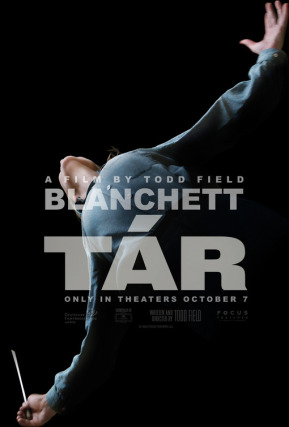JEANNE’S REVIEW
The Cate Blanchett, two-time Oscar winner for Best Actress, BLUE JASMINE (2013) and Best Supporting Actress, THE AVIATOR (2004) along with many other nominations, stars as Lydia Tár in Todd Field’s long-awaited new feature, TÁR. It’s another incredible performance from the perfectionist Blanchett, and while the average moviegoer may not find the story of a female orchestra conductor particularly engaging, there are those who will be astounded by her all-consuming portrayal.
Writer/producer/director Field opens TÁR with a rather lengthy interview between Tár and Adam Gopnik at The New Yorker Festival. While Field’s writing throughout TÁR is exceptional, this sequence goes on longer than necessary. Gopnik establishes in short order Tár’s impressive resumé, including the fact that her specialty is music from the Ucayali Valley in Eastern Peru. She has conducted all the “Big Five” American orchestras and she is only one of a handful of EGOTs, Emmy, Grammy, Oscar and Tony winners.
Now Tár is the first female conductor of the very prestigious Berlin Orchestra, a position she’s held for seven years. She refers to herself as a “U-Haul lesbian” and has been in an established relationship with Sharon Goodnow (Nina Hoss), who is the concertmaster of the same orchestra. Together they are raising their adopted Syrian daughter, Petra (Mila Bogojevic), in an ultra-modern home in Berlin.
Tár surrounds herself with people who are obsessively loyal, like her assistant, Francesca Lentini (Noémie Merlant), and her predecessor, Sebastian Goodnow (Allan Corduner), both of whom she will eventually screw over. As she is preparing for the live performance and recording of Mahler’s Symphony No. 5 and her book launch in New York, things begin to unravel for this maestro, something for which she is completely unprepared.
There is no doubt that Blanchett has given the performance of a lifetime. Her dedication to her craft, according to Field, in preparation for this remarkable role was Herculean. She learned to speak German, play the piano and conduct an orchestra. None of this is simple stuff, plus she did it all while filming two other movies. Honestly, I was exhausted just reading all about her feats in the production notes.
TÁR gets off to a slow start as I mentioned, but once it delves into her everyday life and her myriad of problems, the movie is captivating. Blanchett is mesmerizing --- you simply can’t take your eyes off her, though in one startling and horrifying scene, I had my jacket over my head.
Tár is a woman caught up in a mess of her own making, though she can’t seem to help herself. She uses people for her own gain, then discards them at will. In this era of the MeToo movement, she is the poster child for what not to do. In her defense, men have been getting away with this crap for years --- and years --- but now, for Tár or anyone else --- it’s no longer acceptable, and of course, it shouldn’t be.
The entire cast is first rate. Hoss, Merlant and Corduner are perfect for their roles. Mark Strong, who plays Eliot Kaplan, an investment banker and amateur conductor, who has financed and supported Tár for many years, is superb. And first-time actor and cellist, Sophie Kauer was cast as Olga Metkina, Tár’s latest in a long line of young women she’s “mentored”. Kauer is phenomenal, both as a cellist and a thespian.
As one would expect for a film about a conductor, the score by Academy Award-winning composer Hildur Guðnadóttir is exemplary. TÁR is to classical music what Marvel Universe is to the comics. It’s not always pretty, but it gets the point across.
Opinion: See It Now! (for Blanchett’s performance)
DAVID’S REVIEW
One could never accuse Cate Blanchett of being lazy. To prepare for her role as the fictional conductor Lydia Tár in the new film TÁR, Blanchett had to learn how to play the piano, speak German and drive a speeding car at 60 mph in and around eight other autos driven by stunt people. The result is a career best performance that should place her among the nominees for Best Actress in 2023.
However, that does not make the movie a must see. At 157 minutes the film is way too long and repetitive. While it’s interesting to see Blanchett go through the machinations of being a conductor --- at the Berlin Orchestra where no female has ever been on the
podium --- it’s not enough to heartily recommend TÁR.
Writer-producer-director Todd Field calls his film a fairy tale because no female has ever been a conductor at the most elite orchestras, like New York, Chicago, Boston, Cleveland and Philadelphia --- or Berlin and London. But Blanchett certainly has us believing a woman is capable of such a position.
Her character also progresses from being highly qualified to destroying her career. We first meet Tár as she sits for an interview in front of a live audience where Adam Gopnik, as himself, asks the questions and flavors the commentary. It is exceptionally well orchestrated --- no pun intended --- but it goes on for a very long time.
The interview serves the purpose of delineating all of Tár’s incredible accomplishments. It also represents the acme of her impressive resumé because things happen in the story that will contribute to her eventual downward spiral from well-respected maestro to near social reject.
Clearly a perfectionist, she is a complete taskmaster as she demands her musicians repeat their pieces again and again in rehearsals over the most minute “mistakes”. She also alienates her people by fawning over a young Russian cellist played by Sophie Kauer --- who, in real life, is an excellent cellist. She also advocates the firing of her long-time mentor Sebastian Goodnow (Allan Corduner) which doesn’t sit well with anyone.
Even more destructive is her implicit involvement in the suicide of a past mentee named Krista Taylor. The emails she writes about this person were supposed to be discarded by her assistant Francesca Lentini (Noémie Merlant). The question remains did Francesca purposely keep them intact?
The final straw comes following her confrontation with long-time financial banker and amateur conductor Eliot Kaplan (Mark Strong), an act that should have made her a total pariah. To detail it in this review would be a disservice, but it is a rather unfathomable act.
Opinion: Wait for VOD


